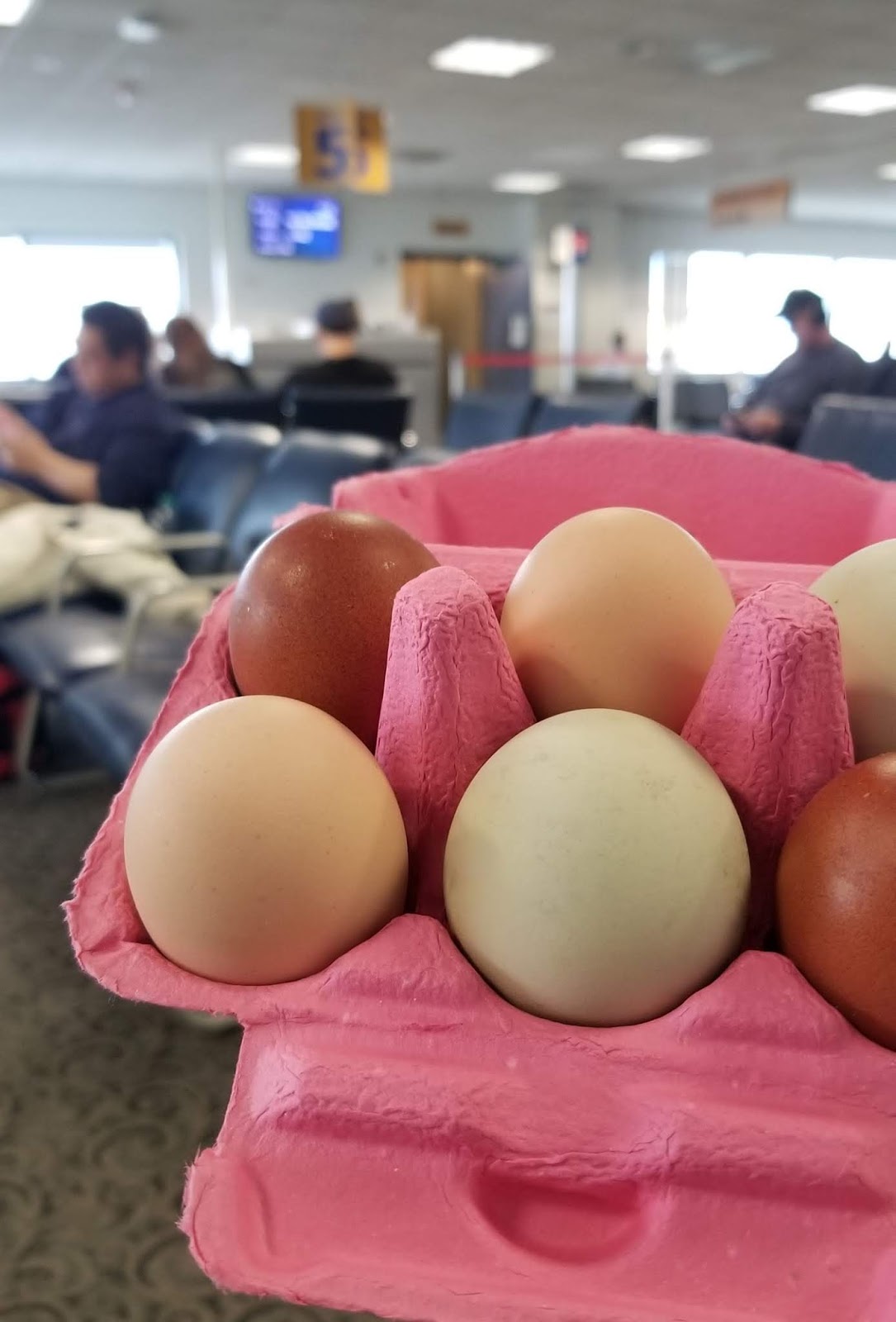Are you wondering if you can bring eggs on a plane? Well, let me crack this question open for you! (15 words)
Traveling can be egg-citing, especially when it comes to packing your snacks. But can you bring eggs on a plane? Before you scramble for an answer, let’s dive into the yolky details together. (27 words)
Whether you’re planning to bring hard-boiled eggs or fresh ones, this guide will help you navigate the sometimes-confusing world of airport security. So grab your wings, and let’s take flight into the egg-cellent world of traveling with eggs! (30 words)
Wondering if eggs are allowed on a plane? As a general rule, solid foods like eggs are permitted in carry-on or checked bags. However, it’s crucial to consider the packaging and transportation conditions. To prevent breakages, it’s best to wrap eggs individually and cushion them properly in a secure container. Always check with your airline’s specific regulations to confirm any additional requirements or restrictions.

Can You Bring Eggs on a Plane?
When it comes to packing for a flight, there are certain restrictions and guidelines that travelers need to follow. From prohibited items to limitations on carry-on baggage, it’s important to be aware of what you can and cannot bring on a plane. But what about perishable items like eggs? Can you bring eggs on a plane? In this article, we’ll explore the rules and regulations surrounding the transportation of eggs on flights, ensuring you have all the information you need for a hassle-free journey.
The Transportation Security Administration (TSA) Guidelines
The Transportation Security Administration, or TSA, is the governing body responsible for security measures at airports in the United States. They have set guidelines in place to ensure the safety of passengers and prevent any potential threats. When it comes to bringing eggs on a plane, the TSA permits them both in checked baggage and carry-on luggage. However, there are a few important considerations to keep in mind.
1. Packaging and Storage
When packing eggs for a flight, it’s crucial to ensure they are properly packaged and stored. Raw eggs should be placed in a secure container, such as a plastic egg carton or a hard-sided cooler, to prevent breakage. It’s also important to keep the eggs refrigerated before and during your travel to maintain their freshness. If you’re bringing hard-boiled eggs, make sure they are placed in a sealed container to avoid any odors or leaks.
2. Quantity Restrictions
While the TSA allows you to bring eggs on a plane, there may be quantity restrictions depending on the airline and destination. It’s essential to check with your specific airline or consult their website for any limitations on the number of eggs you can transport. Some airlines may have specific policies in place, especially for international flights or flights to certain countries with stricter agricultural regulations.
3. Security Screening
When going through the security screening process at the airport, you will need to remove the eggs from your bag and place them in a separate bin for inspection. This allows the TSA agents to have a clear view of the contents of your bag. If you have any concerns about the eggs being damaged during this process, you can request a hand inspection of your luggage. It’s always a good idea to arrive at the airport early to allow for any additional screening or inspections.
The Benefits of Bringing Eggs on a Plane
Now that we know it’s possible to bring eggs on a plane, let’s explore some of the benefits of doing so. First and foremost, if you have dietary restrictions or specific dietary preferences, bringing your own eggs ensures that you have access to a reliable and familiar source of protein. This can be particularly important for individuals with food allergies or sensitivities. Additionally, if you’re traveling to a remote or unfamiliar destination where access to fresh eggs may be limited or uncertain, bringing your own eggs can provide peace of mind when it comes to meal planning and preparing your own food.
Another benefit of bringing eggs on a plane is the ability to save money. Airport and airplane food can be expensive, and the options may not always align with your dietary needs or preferences. By bringing your own eggs, you can avoid the high costs of purchasing meals at the airport and have more control over your food choices.
Lastly, bringing your own eggs can contribute to sustainable travel. By packing your own food, you reduce waste from single-use packaging and can choose to purchase eggs from local, organic, or sustainable sources. This supports local farmers and reduces carbon emissions associated with transporting food. It’s a small but impactful way to make conscious choices while traveling.
Tips for Bringing Eggs on a Plane
Now that you know the guidelines and benefits of bringing eggs on a plane, here are some additional tips to ensure a smooth and successful journey:
- Always check the rules and restrictions of your specific airline and destination before packing eggs.
- Consider using hard-boiled eggs for convenience and ease of transport.
- Label your containers to avoid any confusion or mix-ups.
- Use cold packs or ice packs to maintain the temperature of the eggs during travel.
- Inform the TSA agents about the presence of eggs in your bag during the security screening process.
- If you’re unsure about any aspect of bringing eggs on a plane, contact your airline directly for clarification.
Conclusion
When it comes to the question of whether you can bring eggs on a plane, the answer is yes – as long as you follow the guidelines and regulations set by the TSA and your specific airline. Proper packaging, storage, and consideration of any quantity restrictions are key factors to keep in mind. Bringing your own eggs can offer a range of benefits, from ensuring dietary preferences are met to saving money and supporting sustainable travel. By being well-informed and prepared, you can enjoy your journey with the comfort of having your own eggs at hand.
Key Takeaways: Can You Bring Eggs on a Plane?
- Yes, you can bring eggs on a plane, but there are some restrictions to be aware of.
- Eggs can be carried in both checked baggage and carry-on baggage.
- If carrying eggs in checked baggage, make sure they are properly protected to avoid breakage.
- If carrying eggs in carry-on baggage, ensure they meet the liquid restrictions and are securely packaged to prevent any leaks.
- It’s always a good idea to check with your airline’s specific regulations before traveling with eggs.
Frequently Asked Questions
Are you wondering about the rules concerning transporting eggs on a plane? We’ve got you covered! Here are some frequently asked questions about bringing eggs on a plane, along with their answers.
1. Can you bring eggs on a plane?
Yes, you can bring eggs on a plane, but there are a few important things to keep in mind. Firstly, it’s best to check with the specific airline you’re flying with, as they may have their own guidelines regarding the transportation of eggs.
Secondly, if you’re planning on bringing eggs in your carry-on luggage, be aware that they may be subject to additional screening. It’s recommended to pack them in a sturdy container to prevent any accidental breakage. If you’re unsure, it’s always a good idea to contact the airline beforehand for clarification.
2. How should I pack eggs for air travel?
When packing eggs for air travel, it’s important to ensure they are well protected to avoid any damage or leakage. Start by choosing a sturdy container, such as a hard-sided cooler or an egg carton. If using an egg carton, you may want to secure it with tape to prevent it from opening during transit.
To provide an extra layer of protection, consider wrapping each individual egg in bubble wrap or placing them in plastic bags. This will help prevent any accidental breakage. Finally, make sure the eggs are securely packed in your checked or carry-on luggage, taking care not to place heavy objects on top of them.
3. Are there any restrictions on the quantity of eggs I can bring on a plane?
While there are generally no restrictions on the quantity of eggs you can bring on a plane for your personal use, it’s still a good idea to be mindful of the weight and space limitations of your luggage. If you’re carrying a large quantity of eggs, it’s recommended to pack them in your checked luggage rather than your carry-on to avoid any potential issues during security checks.
If you’re planning on transporting eggs for commercial purposes, such as selling or distributing them, there may be additional regulations and requirements that you need to meet. It’s important to check with the relevant authorities and adhere to their guidelines.
4. Can I bring eggs from another country on a plane?
Bringing eggs from another country on a plane can be subject to certain restrictions and regulations. It’s essential to be aware of the customs and agricultural restrictions of both the country you’re departing from and the destination country.
In many cases, bringing eggs from one country to another may require special permits or certifications to ensure compliance with food safety and biosecurity measures. It’s advised to contact the customs authorities or the embassy/consulate of the destination country beforehand to obtain accurate and up-to-date information.
5. Are there any alternatives if I can’t bring eggs on a plane?
If you’re unable to bring eggs on a plane or prefer not to, there are alternatives you can consider. One option is to purchase eggs at your destination. Most grocery stores and supermarkets have eggs readily available.
Alternatively, you can also look into powdered or dehydrated eggs, which are lightweight and convenient for travel. These can be easily rehydrated and used in various recipes. Just make sure to check the specific regulations regarding powdered or dehydrated eggs if you plan on bringing them with you.
Summary
So, can you bring eggs on a plane? The answer is yes, but there are some important things to keep in mind. First, check with the airline you’re flying with to see if they allow eggs on board. Some airlines might have specific rules or restrictions. Second, make sure the eggs are properly packaged to avoid any mess or damage. This means putting them in a secure container or carton, and perhaps even wrapping them in some padding. Finally, be mindful of how many eggs you bring. Most airlines have limits on the number of eggs you can bring, so be sure to check before packing them in your suitcase.
Remember, eggs are a delicate food item and can easily break. But with a little bit of planning and preparation, you can enjoy your eggs even when you’re traveling. Just make sure to follow the rules and guidelines set by the airline, keep the eggs safe and secure, and be aware of any limits on the number of eggs you can bring. Bon voyage and happy travels!

After visiting more than 60 countries, I have probably been on every type of plane there is and visited countless airports. I did my very first international solo trip to South Africa at the age of only 16 and haven’t really stopped traveling since.
Despite the adventurous travel itch, I do have a nerdy side as well – which is satisfied by writing about all things aviation “too boring” for my regular travel blog.
